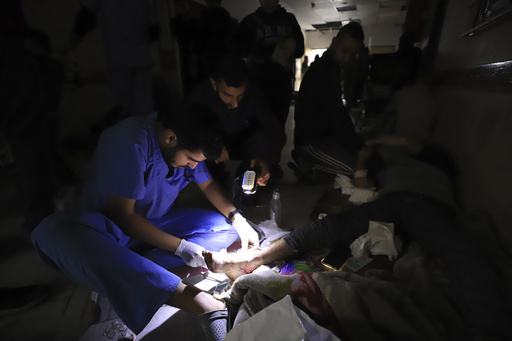
JERUSALEM — Originally designed to offer healing, three hospitals in northern Gaza are once again surrounded by Israeli military forces and are enduring relentless bombardment. Israel is conducting a renewed offensive against Hamas, alleging that their fighters have reorganized in close proximity to these medical facilities. As medical staff rush to assist the influx of injured individuals, they are burdened by the repeated assaults on hospitals, a phenomenon that has become alarmingly prevalent in modern conflict.
The Kamal Adwan, al-Awda, and Indonesian hospitals had previously experienced sieges and incursions by Israeli troops around 10 months ago and have not yet recovered from the significant damages incurred. These hospitals currently stand as the only ones partially operational in the region. Though hospitals have typically been safeguarded under international law in conflict zones, Israel has adopted a distinct approach by actively targeting these medical facilities. Over the past year, Israel has laid siege to and raided at least ten hospitals across Gaza, using the rationale of military necessity in pursuit of Hamas following the militant group’s attack on October 7, 2023. The Israeli government claims that Hamas utilizes these hospitals for military operations, complicating their status as protected spaces.
Rear Admiral Daniel Hagari, an Israeli military spokesman, emphasized the necessity of dismantling what he claims is Hamas’s use of hospitals to maintain their operational capabilities. While the Israeli forces raided Gaza City’s Shifa Hospital—its largest medical institution—producing a video that depicted it as a primary base for Hamas, the validity of the evidence presented has come under scrutiny. The focus on Shifa could eclipse the experiences of other hospitals, such as al-Awda, Indonesian, and Kamal Adwan, which suffered raids themselves. Investigations revealed scant evidence from Israel to support claims of significant Hamas activities at these facilities.
At al-Awda Hospital, the Israeli military has yet to substantiate any allegations of Hamas presence. As the fighting escalated in the nearby Jabalia refugee camp, the hospital found itself incapacitated, with no access to food or medical supplies. The director, Mohammed Salha, expressed despair as his team continued to treat patients amid acute shortages. “We are reliving the nightmares of last year, but worse,” he lamented, highlighting the dire conditions affecting both patients and staff.
Previous incidents at al-Awda included the tragic death of medical personnel and patients due to strikes near the hospital. Eyewitness accounts reveal that civilians attempting to reach the hospital faced lethal consequences, further compounding the chaos. Similar bleak episodes were reported at the Indonesian Hospital, where artilleries struck upper floors, resulting in fatalities and medical crises compounded by supply shortages.
Four patients succumbed due to power outages as resources dwindled. Indonesian medical staff described the devastating emotional toll of seeing patients die due to lack of essentials. “To see patients dying before your eyes because you don’t have the ability to help them, you have to ask yourself: ‘Where is humanity?’” questioned one volunteer, reflecting the desperation felt within these overwhelmed facilities.
Meanwhile, Kamal Adwan Hospital, a critical healthcare provider, suffered fresh devastation as military operations ignited fires that destroyed recently delivered medical supplies. With nearly all of its staff detained during an earlier raid, the situation has reached a tipping point, with only two doctors remaining to care for a continuous influx of wounded patients. The hospital’s director, Hossam Abu Safiya, has expressed profound grief, recalling how the military’s actions have led to devastating personal losses.
In light of the Israeli military’s ongoing justifications for their aggressive tactics, some healthcare officials and humanitarian organizations have publicly contested these claims, citing a blatant disregard for international laws protecting medical facilities. Reports from U.N. investigations previously stated that Israeli practices serve as collective punishment against the Palestinian population, exacerbating the ongoing humanitarian crisis.
As the conflict continues, many individuals now approach hospitals with trepidation, fearing for their safety within these sectors that are traditionally considered sanctuaries. With a profound sense of insecurity surroundinging medical facilities, there is an urgent call to restore the perception of hospitals as places of refuge rather than fear.

